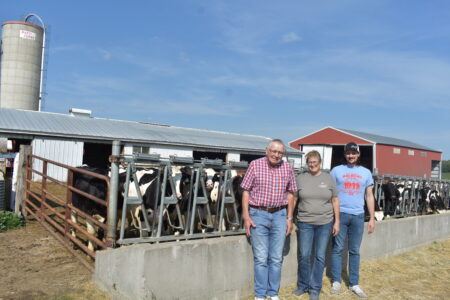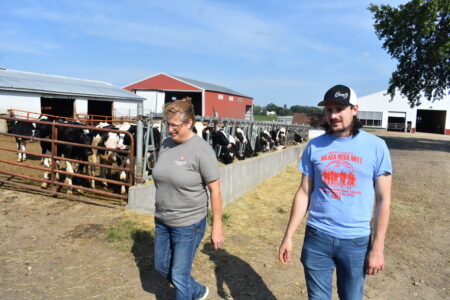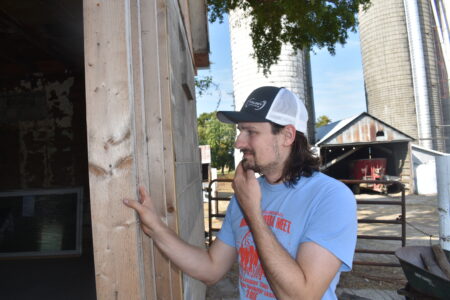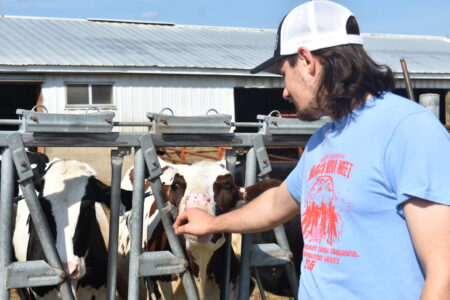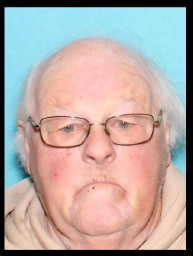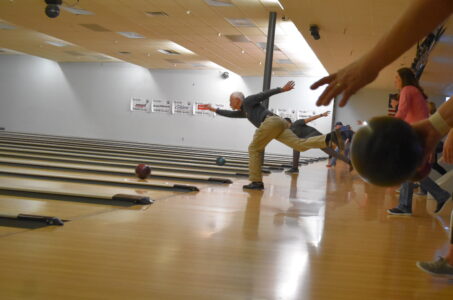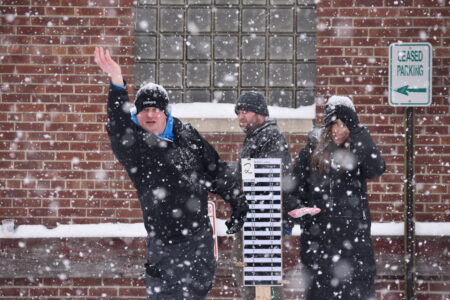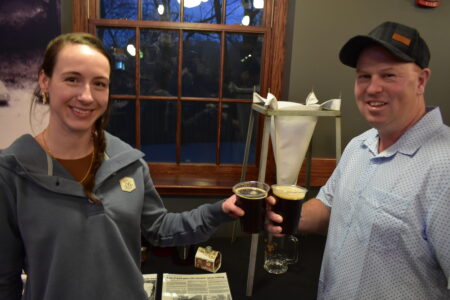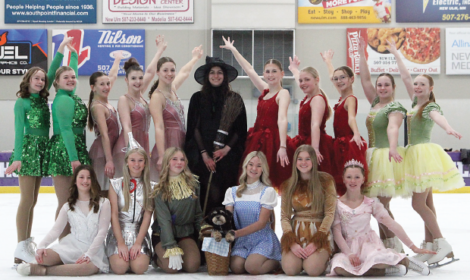Olmar Farms prosper through generational support
- Jill Nelson and her son Isaac Nelson walk past the family holsteins. The registered holsteins are descended from cows purchased by Jill’s grandfather Oliver Marti in 1944.
- Olmar Farms is expanding into the cheese market. The Nelson family is working on building a new creamery. Isaac Nelson examines the progress on the construction during a visit to home farm.
- Isaac Nelson reaches out to one of his family’s dairy cows on a visit to the home farm.
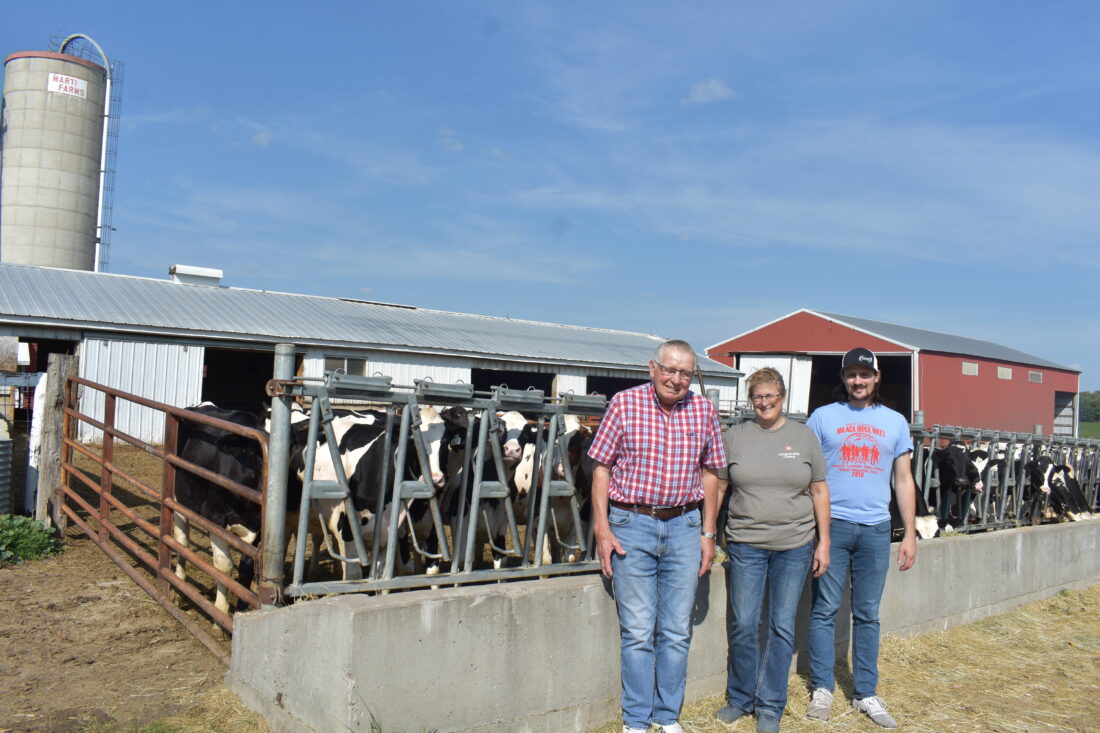
SLEEPY EYE — Olmar Farms, located a few miles outside of Sleepy Eye, received Century Farm status in 1984.
Jill and Brian Nelson currently own and operate the farm, which was originally purchased by Jill’s great-great-grandfather Gustave Schultz. Jill said the original deed reads 1884, but other paperwork suggests they began purchasing the farm in 1876.
Either way, Olmar Farms will reach Sesquicentennial Farm status within the next decade. This is a large part thanks to multiple generation of family working the farm side by side. Jill and Brian Nelson have been the main operators of Olmar Farms since Jill’s father, Roger Marti, retired.
“I run the dairy part of it,” Jill said. “And Brian runs the cropping, feeding and maintenance.”
Jill said after they learned her father planned to retire, she moved back to the farm with her husband, and two sons, Josh and Isaac.
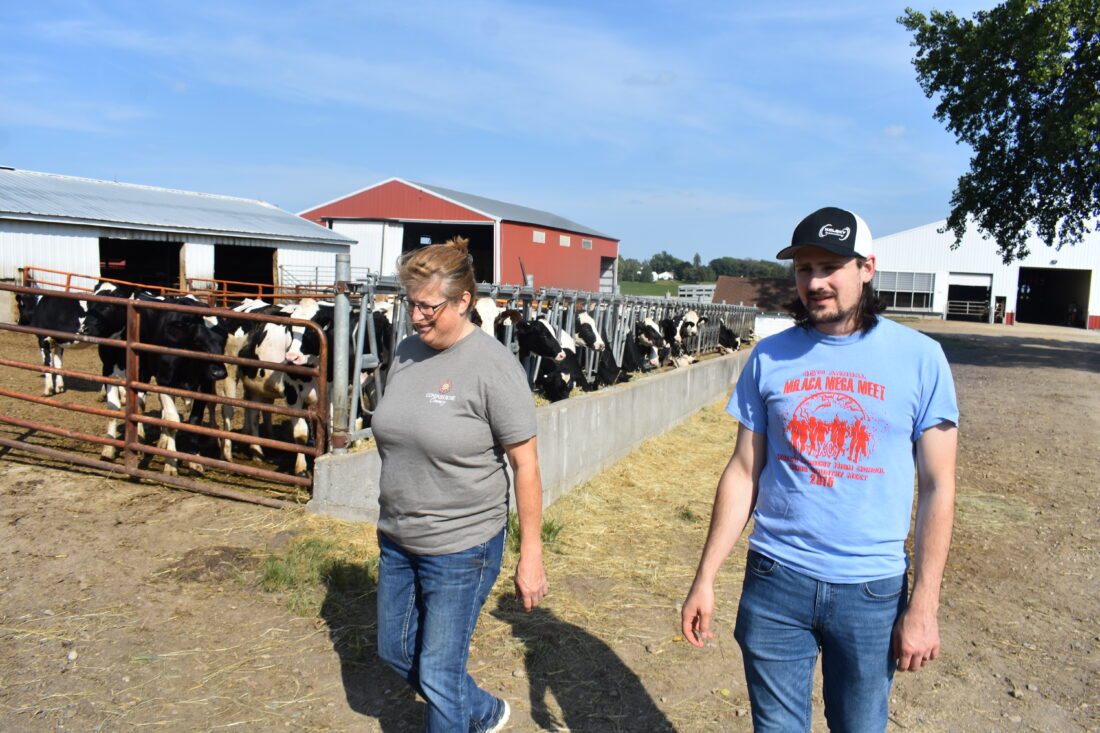
Jill Nelson and her son Isaac Nelson walk past the family holsteins. The registered holsteins are descended from cows purchased by Jill’s grandfather Oliver Marti in 1944.
“The next day after we came home, we came to the house for breakfast and my mom handed me the checkbook,” Jill said.
That was not the end of the previous generation’s involvement. Jill’s uncle Floyd Marti had been farming alongside his brother since 1976 and decided to continue helping with his niece until he too “retired” six years later in 2008. However, Floyd continues to assist on the farm to this day. His home is located next door and still shows up every day to help where possible.
“I come over every morning, make sure everything is going OK,” Floyd Marti said. “I feed calves and check them over.”
“Floyd is an extra set of eyes on the animals,” Jill said.
“Maybe I can’t take care of the animals, but I can tell Jill if I notice something,” Floyd Marti said. “I can tell her if a cow’s going to have a calf soon.”
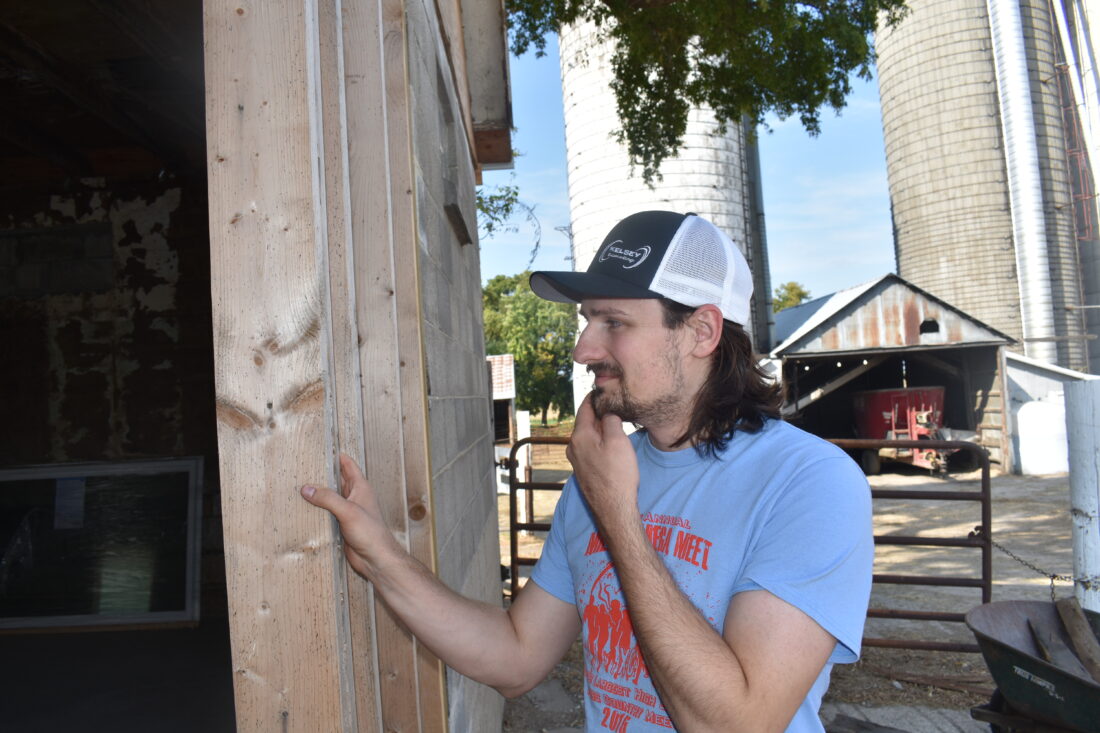
Olmar Farms is expanding into the cheese market. The Nelson family is working on building a new creamery. Isaac Nelson examines the progress on the construction during a visit to home farm.
Though Floyd Marti has taken a smaller role in the operation of Olmar Farms, he has proven invaluable for keeping track of the farm’s history.
Floyd Marti said from the beginning the Olmar Farms was a dairy farm, but they were not always registered cows.
“In 1944, my dad (Oliver Marti) bought the first registered cows,” he said. The farm’s first registered Holsteins came from South Dakota. Oliver Marti traveled there with a neighbor to purchase the cows.
“We have cows that go back to that first purchase,” Jill said.
“I was born when he bought the first registered cow,” Floyd said. “I am 81 now.”
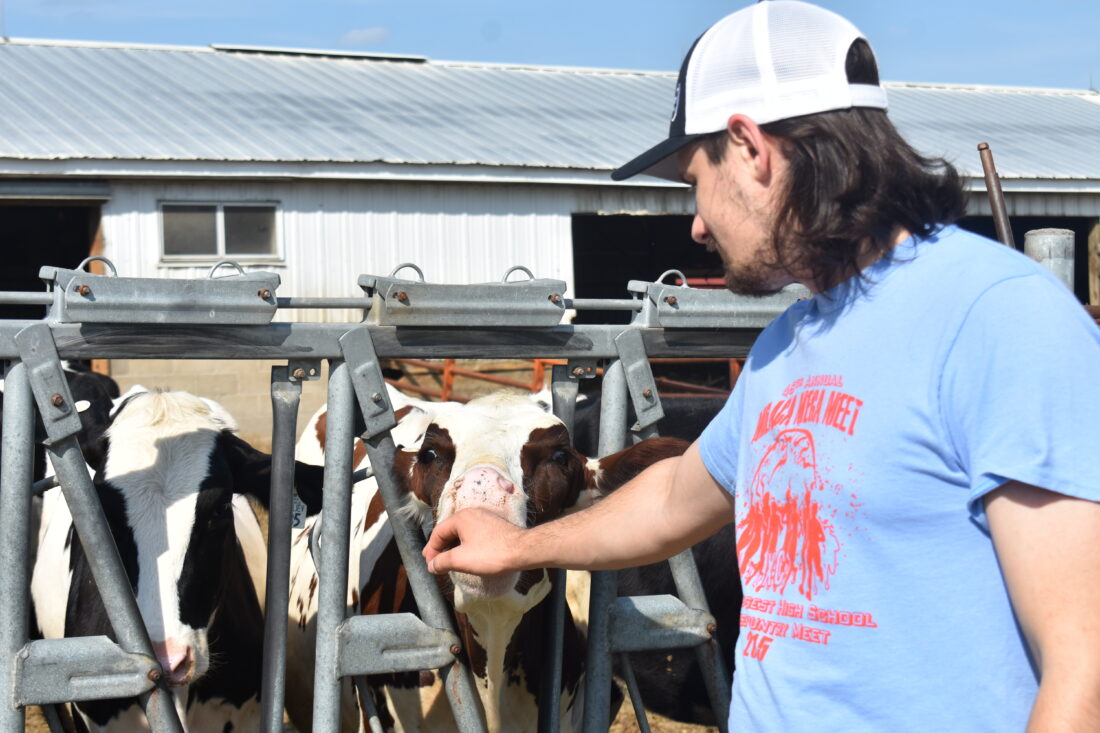
Isaac Nelson reaches out to one of his family’s dairy cows on a visit to the home farm.
Floyd said a new barn was constructed on the farm in 1947 to accommodate the new holsteins. A milking parlor was constructed in 1963. Floyd said the milking parlor was built around the time his brother was Roger was drafted and he went to college.
“My parents lost half their workforce,” he said. “That’s why they needed a milking parlor.”
Roger and Floyd would both eventually turn to the farm and run it together with their father for a few decades.
Floyd said one of the reasons the family was able to work together generation after generation was that they enjoyed the work and complemented one another.
“You have to like what you are doing,” Floyd said. “I liked working with the cow, [Roger] liked cropping and spraying. Everyone found their niche.”
Jill said the family had a long history of overcoming challenges. She said her grandmother Verla Marti lost her grandfather Gustave Schultz and father, Benny Schultz, within a week of each other. She was 12 years old at the time and the farm fell to her and her mother, Ella Schultz.
“This was right before the bank failure and depression,” Jill said, “But my grandmother and great-grandmother kept the farm going.
Looking to the future, Olmar Farms is expanding into the artisan cheese market. This involves the construction of a new creamery with aging caves. Olmar Farms is making this jump into cheese with the help of Jill and Brian’s son, Isaac.
Isaac has been helping on the family farm most of his life. His first chores were feeding the calves. Later, he graduated to driving the skid steer.
Isaac does not currently live on the farm, but he returns home to assist with the creamery. He had attended the University of Minnesota for food and animal science and has worked at Redhead Creamery. Now, Isaac Nelson is bringing his expertise back home.
“We’re making artisan cheese, focusing on the Alpine style,” Isaac said. He described it as the type of cheese that grows in the mountains of Switzerland or France. The idea is to replicate this style in Minnesota.
Expanding into cheeses is an exciting addition to Olmar Farms, but the family has always responded well to changes.
Floyd Marti said there was a time when the farm was all horsepower, but then his dad bought a tractor.
More recently, Isaac Nelson said he remembered attending the National Future Farmers of America convention and seeing a cab-less tractor.
“It was all AI remote control with presets,” he said.
Jill Nelson said the rise of robotic farming equipment was impressive, but she was most astonished by advancements in nutrition knowledge. Science has changed greatly in a short time, flipping conventional wisdom. She said having 30,000 pounds of milk average and milking twice a day was unthinkable when she was in high school, but that’s what they are doing now.
Floyd Marti said genetic testing for livestock and crops had led to the greatest change.
“Back in the day, 30 bushels an acre for soybeans was good, but now 60 bushels is very common,” Floyd said. “And it’s the same ground as the other stuff was planted.”
All three generations were in agreement that it is best to embrace changes in farming.
“You either change or you die,” Jill said. “At least in this industry. We’re not trying to get bigger, but the margins in dairy farming are small margins. We need new methods of getting other income.”
Looking to the next generation of farming, Jill Nelson said her hope was that Olmar Farms will continue, but she is not sure if it will continue in the family. She had no intention of pressuring Isaac or Josh to carry on the tradition.
“Every generation has to decide for themselves,” she said. “This isn’t a lifestyle for everybody. It is hard, but it is worth it if you love it.”

